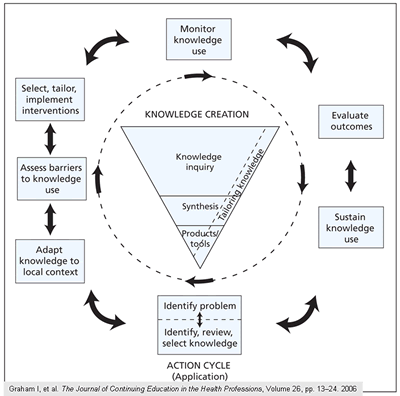Introduction to Knowledge Translation
The Canadian Institute of Health defines Knowledge Translation as a “dynamic and iterative process that included synthesis, dissemination, exchange and ethically-sound application of knowledge to improve the health of (the population), provide more effective health service and products and strengthens the health care system”. It provides a framework to help clinicians with intervention strategies with the goal of changing clinician behavior to adopt best practice interventions to their patients.
KTA Cycle

Articles
- Graham ID, Logan J, Harrison MB, et al. Lost in knowledge translation: time for a map? J Contin Educ Health Prof. 2006;26(1):13-24.Atkins L, Francis J, Islam R, et al. A guide to using the Theoretical Domains Framework of behaviour change to investigate implementation problems. Implement Sci. 2017;12(1):77.
- Brouwers M, Stacey D, O’connor A. Knowledge Creation: Synthesis, Tools and Products. CMAJ. 2012 Feb 9; 182(2):E68-E72.
- Kitson A, Straus SE. The Knowledge to Action Cycle: Identifying The Gaps. CMAJ. 2010 Feb 9; 182(2): E73-7.
- Hadley k, power E, O’Halloran R. Speech Pathologists’ Experiences with Stroke Clinical Practice Guidelines and The Barriers and Facilitators Influencing Their Use: A National Descriptive Study. BMC Health Service Research. 2014; 14:110.
- Salbach N, Jaglal S, Korner-Bitensky N, et al. Practitioner and Organizational Barriers to Evidence-Based Practice of Physical Therapists for People with Stroke. Physical Therapy. 2007 Oct; 87(10):1284-303.